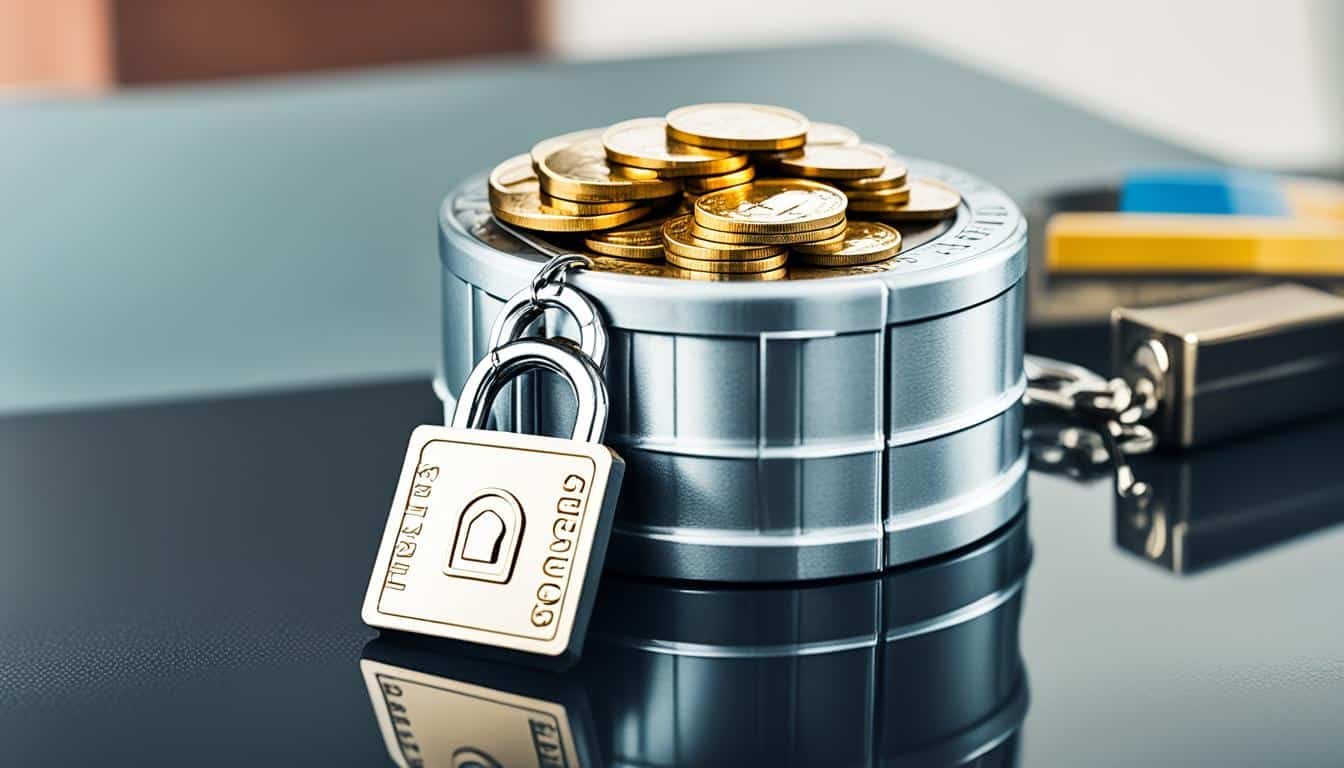Secured loans can be a valuable financial tool when you need to borrow a substantial amount of money. But what exactly are secured loans? And how do they differ from unsecured loans? In this guide, we will explore the ins and outs of secured loans, helping you make informed decisions and borrow safely.
Key Takeaways:
- Secured loans are loans that require collateral, such as a home or car.
- They offer lower interest rates and larger borrowing limits compared to unsecured loans.
- If you default on a secured loan, the lender has the right to seize the collateral.
- Unsecured loans, on the other hand, do not require collateral but may have higher interest rates and stricter approval requirements.
- Before taking out a secured loan, consider factors such as interest rates, your credit score, and your ability to afford the monthly payments.
What is a Secured Loan?
A secured loan is a type of loan that is guaranteed by collateral. This means that if a borrower defaults on the loan, the lender has the right to seize the collateral to recoup their losses. Secured loans offer lenders more security and lower risk compared to unsecured loans.
Examples of secured loans include:
- Mortgages: Loans used to purchase or refinance real estate properties.
- Auto loans: Loans used to finance the purchase of a vehicle.
- Secured credit cards: Credit cards that require a security deposit as collateral.
- Secured personal loans: Personal loans that are backed by collateral.
These loans require the borrower to provide collateral, which can be in the form of real estate, vehicles, or other valuable assets. The collateral acts as a guarantee for the lender, reducing the risk of lending money.
Collateral: Protecting the Lender’s Interests
The collateral pledged for a secured loan serves as a form of protection for the lender. It provides assurance that they can recover their investment even if the borrower defaults on the loan.
For example, in the case of a mortgage loan, the home being purchased serves as collateral. If the borrower fails to make their mortgage payments, the lender can initiate foreclosure proceedings and sell the property to recover the outstanding balance.
Similarly, in the case of an auto loan, the vehicle being financed acts as collateral. If the borrower defaults on the loan, the lender can repossess the car to recoup their losses.
Image:
“A secured loan allows borrowers to access larger loan amounts and lower interest rates, making it an attractive option for those with valuable assets to pledge as collateral.”
While secured loans offer benefits for borrowers, such as lower interest rates and larger loan amounts, it’s important to carefully consider the risks and obligations involved. Defaulting on a secured loan can result in the loss of the pledged collateral, having serious financial consequences.
In contrast, unsecured loans do not require collateral but often come with higher interest rates and stricter qualification criteria. They rely solely on the borrower’s creditworthiness and promise to repay the loan as agreed.
Understanding the nature of secured loans and their benefits and risks is crucial to making informed borrowing decisions. Before applying for a secured loan, it’s recommended to explore different options, compare rates and terms, and assess your ability to repay the loan comfortably.
What is an Unsecured Loan?
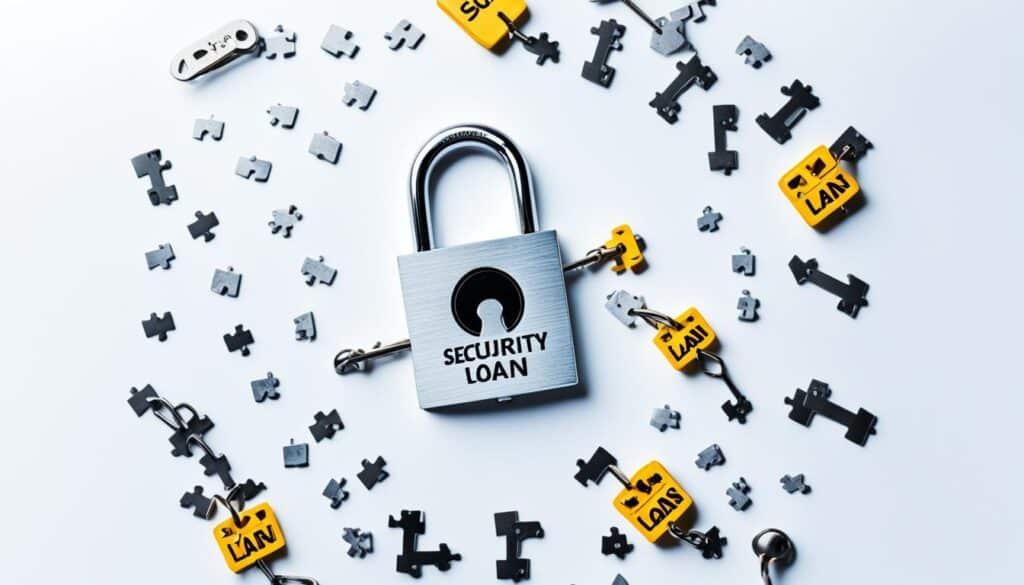
An unsecured loan is a type of loan that does not require collateral. Unlike secured loans, which are backed by assets like a home or car, unsecured loans are based solely on the borrower’s creditworthiness.
Examples of unsecured loans include personal loans, unsecured credit cards, and student loans. These loans can be used for various purposes such as consolidating debt, funding a vacation, or covering unexpected expenses.
When applying for an unsecured loan, lenders primarily consider the borrower’s credit score, income, and financial history to determine eligibility and loan amount. A higher credit score typically translates to better loan terms and lower interest rates.
Unlike secured loans, unsecured loans generally have lower borrowing limits and higher interest rates to offset the increased risk for lenders. Additionally, borrowers may be subjected to a credit check during the application process to assess their creditworthiness.
Benefits of Unsecured Loans:
- Flexibility: Unsecured loans provide borrowers with the freedom to use the funds for various purposes without restrictions.
- No collateral required: Borrowers do not have to put up their valuable assets as collateral, reducing the risk of losing them in case of default.
- Streamlined application process: Compared to secured loans, unsecured loans often have a simpler and faster application process with fewer documentation requirements.
Risks of Unsecured Loans:
- Higher interest rates: Due to the higher risk involved, unsecured loans usually have higher interest rates than secured loans.
- Loan limits: Unsecured loans typically have lower borrowing limits compared to secured loans, which may limit the amount you can borrow.
- Stricter eligibility requirements: Lenders may have stricter eligibility criteria, including a minimum credit score and income requirements, to mitigate the risks associated with unsecured lending.
While unsecured loans offer flexibility and convenience, it’s essential to carefully evaluate your financial situation and consider the terms and conditions before committing to borrowing. Make sure you have a clear repayment plan and assess your ability to make timely loan payments to avoid damaging your credit score and falling into debt.
Secured Loans vs. Unsecured Loans

When it comes to borrowing money, it’s crucial to understand the difference between secured loans and unsecured loans. These two loan types have distinct features and requirements that can significantly impact your financial decision-making.
Secured loans require collateral, which is an asset that the lender can claim if the borrower fails to repay the loan. Collateral can include properties like real estate or vehicles. The presence of collateral reduces the risk for lenders, allowing them to offer lower interest rates, larger borrowing limits, and more flexible approval requirements. This makes secured loans an attractive option for individuals who have valuable assets to offer as collateral and seek favorable loan terms.
Unsecured loans, on the other hand, do not require collateral. These loans are typically granted based on the borrower’s creditworthiness, income, and employment history. Since there is no collateral involved, unsecured loans are riskier for lenders, which leads to higher interest rates and stricter approval requirements. Borrowers with good credit scores have a better chance of securing an unsecured loan, and these loans are suitable for individuals who do not have valuable assets to offer as collateral.
Understanding the differences between secured and unsecured loans is critical for making informed financial decisions. While secured loans offer lower interest rates and larger loan amounts, they require the borrower to put forward valuable collateral. Unsecured loans, on the other hand, do not require collateral but come with higher interest rates and stricter approval criteria.
The Pros and Cons of Secured Loans and Unsecured Loans
Secured Loans:
- Lower interest rates
- Larger borrowing limits
- Easier approval for individuals with less than perfect credit
Unsecured Loans:
- No collateral required
- Accessible to individuals without valuable assets
- Faster approval process
When deciding between a secured loan and an unsecured loan, consider factors such as your credit score, the presence of collateral, and your financial goals. It’s essential to weigh the advantages and disadvantages of each loan type to determine which option aligns with your needs and financial circumstances.
Secured Loans vs. Unsecured Loans: A Comparison
| Features | Secured Loans | Unsecured Loans |
|---|---|---|
| Collateral Requirement | Required | Not required |
| Interest Rates | Lower | Higher |
| Borrowing Limits | Larger | Smaller |
| Approval Requirements | Looser | Stricter |
It’s important to note that both secured and unsecured loans have their advantages and disadvantages. Choosing the right loan type depends on your specific financial situation, creditworthiness, and the assets you have available for collateral. Conduct thorough research and consider consulting with a financial advisor to make an informed borrowing decision.
How Secured Loans Work
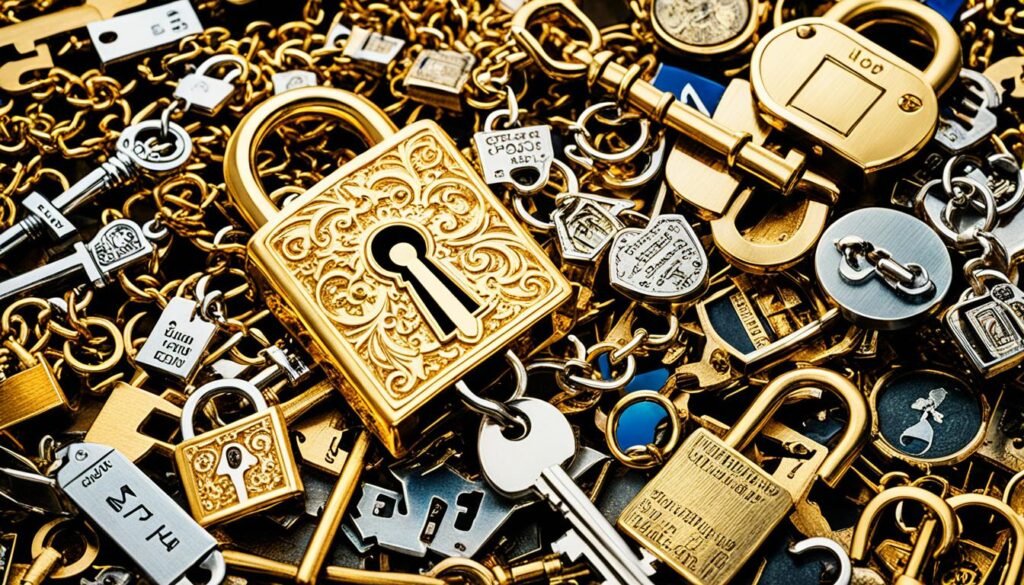
Secured loans are loans that require collateral to secure the loan amount. The collateral is an asset that the borrower offers as a guarantee to the lender in case of default. Collateral can take various forms, such as a home, car, or other valuable assets. By pledging collateral, borrowers can access lower interest rates and larger borrowing limits compared to unsecured loans.
If a borrower defaults on a secured loan, the lender has the right to seize the collateral to recover the outstanding balance. This provides a level of security to the lender, as they have an asset they can liquidate to minimize the potential financial loss. The collateral serves as a safeguard for the lender, enabling them to offer more favorable terms to borrowers.
Personal Loans and Collateral
Secured personal loans are a common type of secured loan that uses personal assets as collateral. Depending on the lender and the borrower’s financial situation, personal loans can be secured by a variety of assets, such as:
- Home equity
- Savings accounts
- Vehicle titles
When personal assets are used as collateral, the lender assesses the value of the asset and determines the loan amount based on that value. The borrower retains possession of the collateral during the loan term, but if they default, the lender has the right to seize the asset.
“Secured loans provide an opportunity for individuals to access larger loan amounts and favorable interest rates by offering collateral as a guarantee. However, it’s important to carefully consider the risks involved and ensure that you have a plan in place to repay the loan to avoid potential loss of your collateral.”
It’s crucial to understand the terms and conditions of a secured loan before proceeding. Borrowers should assess their ability to make timely payments and understand the potential consequences of defaulting on the loan. By managing secured loans responsibly, borrowers can benefit from the advantages they offer while protecting their assets.
| Pros of Secured Loans | Cons of Secured Loans |
|---|---|
|
|
Benefits and Risks of Secured Loans
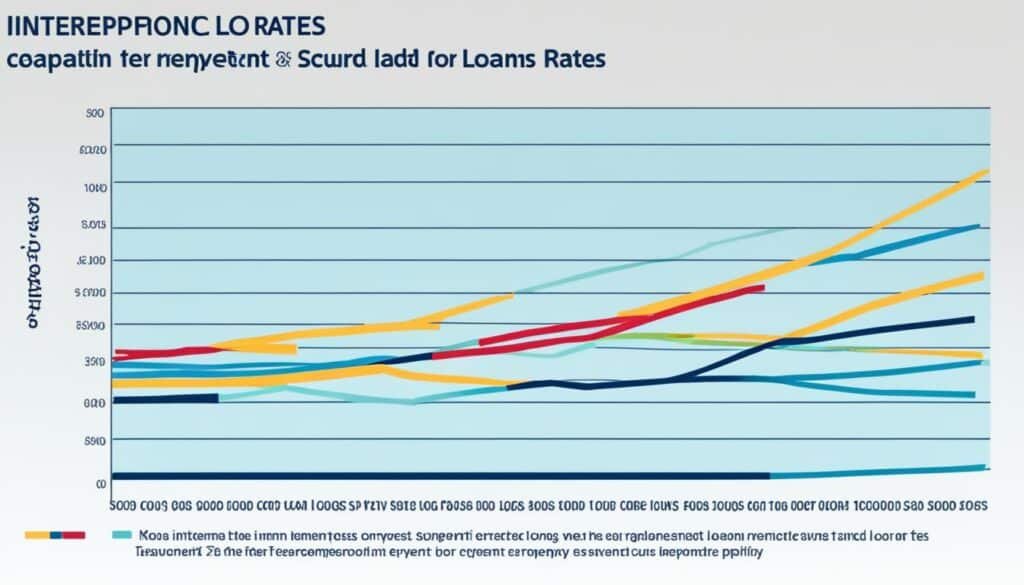
Secured loans can be a valuable financial tool for borrowers looking for lower interest rates, higher borrowing limits, and opportunities to rebuild credit. However, they also come with certain risks that borrowers need to consider before taking on this type of loan.
Benefits of Secured Loans
When it comes to securing a loan, collateral plays a crucial role. By providing collateral, such as real estate or a vehicle, borrowers can access a range of benefits:
- Lower Interest Rates: Secured loans typically offer lower interest rates compared to unsecured loans. Lenders view these loans as less risky since they can claim the collateral in case of default. As a result, borrowers can save money on interest charges over the life of the loan.
- Higher Borrowing Limits: Since secured loans provide lenders with collateral, they are willing to extend larger loan amounts. This makes secured loans an attractive choice for borrowers who need a significant amount of funding.
- Rebuild Credit: Secured loans can also serve as a means to rebuild credit. By making timely payments, borrowers demonstrate their ability to manage debt responsibly, which can improve their credit score over time.
Risks of Secured Loans
While secured loans offer several advantages, it’s important to be aware of the risks involved:
- Potential Loss of Collateral: If a borrower fails to repay the loan as agreed, the lender has the right to seize the collateral. This could result in the loss of the borrower’s home, car, or other valuable asset used as security.
- High Fees and Interest Rates: Secured loans targeted at borrowers with bad credit often come with high fees and interest rates. Lenders may charge higher rates to compensate for the increased risk associated with lending to individuals with less-than-ideal credit scores.
Therefore, it’s crucial for borrowers to carefully assess their financial situation, weigh the benefits and risks, and consider their ability to meet the repayment terms before committing to a secured loan.
“Secured loans provide borrowers with the opportunity to access lower interest rates and higher borrowing limits. However, it’s important to carefully consider the potential risks, such as the loss of collateral, before taking on this type of loan.”
Paying Off Unsecured Debt with a Secured Loan
While it may seem tempting to use a secured loan to pay off unsecured debt, such as credit card debt, it can be a risky move. This is because you would be converting unsecured debt into secured debt, putting your collateral at risk. It’s important to explore other options, such as negotiating payment plans with lenders or seeking credit counseling.
If you are considering using a secured loan to pay off credit card debt, it’s crucial to understand how it works. A secured loan requires you to offer collateral, such as your home or car, to secure the loan. This collateral serves as a guarantee for the lender that they can recover their money if you fail to make payments. By using a secured loan to pay off credit card debt, you are essentially turning your unsecured debt into secured debt by putting your collateral on the line.
Converting unsecured debt into secured debt can have serious consequences. If you default on a secured loan, the lender has the right to seize the collateral to satisfy your outstanding balance. This means that if you use your home or car as collateral for the loan, you could potentially lose these assets if you are unable to make the loan payments.
Before considering a secured loan to pay off credit card debt, it’s important to explore alternative options. One option is to negotiate payment plans with your credit card issuer. Many credit card companies are willing to work with you to create a manageable repayment plan. Another option is to seek credit counseling. A credit counselor can help you develop a personalized debt repayment strategy and provide guidance on managing your finances.
It’s important to carefully weigh the risks and benefits before using a secured loan to pay off unsecured debt. Make sure to thoroughly understand the terms of the loan, including the interest rate, repayment schedule, and any fees involved. Consider consulting with a financial advisor or credit counselor to ensure that you are making the best decision for your financial situation.
Remember, there is no one-size-fits-all solution when it comes to debt repayment. Each individual’s financial circumstances are unique, so it’s crucial to consider all the factors involved before making a decision. Secured loans can be a valuable tool in certain situations, but they should be approached with caution, especially when it comes to using them to pay off unsecured debt.
Considerations Before Taking Out a Secured Loan

When it comes to securing a loan, there are several important factors to consider before making a decision. Taking the time to assess your financial situation and evaluate the terms and conditions of a secured loan can help you make an informed choice.
Evaluating Interest Rates
The interest rate is a crucial aspect of any loan, including secured loans. It determines the cost of borrowing and affects the overall affordability of the loan. Compare interest rates offered by different lenders to find the most competitive option.
Analyzing Your Credit Score
Another significant element to consider is your credit score. Lenders often use credit scores to assess the borrower’s creditworthiness. A higher credit score can lead to better interest rates and loan terms. If your credit score is less than optimal, you may still be eligible for a secured loan, but it’s crucial to understand how it may affect your borrowing options.
Assessing Affordability
Before taking out a secured loan, it’s important to evaluate your ability to afford the monthly payments. Carefully review your income, expenses, and other financial obligations to ensure that the loan payments won’t strain your budget.
“A secured loan can offer favorable interest rates and borrowing limits, but it’s essential to consider your credit score and affordability before making a commitment.”
Comparing Loan Options
Each lender may offer different terms and rates for secured loans. Take the time to shop around and compare loan options to ensure you’re getting the best deal possible. Consider factors such as repayment terms, fees, and any additional benefits offered by the lender.
Seek Professional Advice
If you’re uncertain about the intricacies of secured loans, it’s a good idea to seek advice from a financial professional. They can help you understand the implications of your decisions, evaluate your financial situation, and guide you towards the best borrowing options.
A Visual Comparison of Secured Loan Options:
| Category | Interest Rate | Credit Score Requirement |
|---|---|---|
| Bank A | 4.5% | Excellent |
| Bank B | 5.2% | Good |
| Bank C | 6.0% | Fair |
| Bank D | 7.5% | Poor |
Consider these factors before taking out a secured loan to ensure that you’re making a well-informed decision. By evaluating interest rates, credit scores, affordability, and comparing loan options, you can find the best secured loan that aligns with your financial goals.
Types of Collateral for Secured Loans
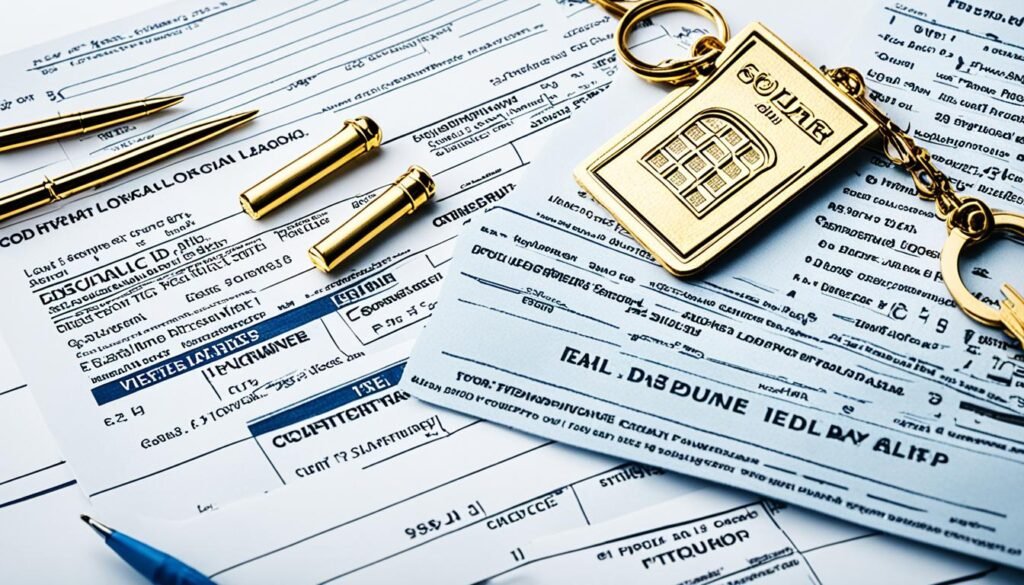
Collateral plays a crucial role in securing a loan, providing lenders with reassurance that they have a valuable asset to recover their funds in case of default. Different lenders and loan types accept various forms of collateral. Here are some common types:
1. Real Estate Properties
Real estate properties, such as homes or land, can serve as collateral for secured loans. The value of the property determines the borrowing limit, and lenders may require an appraisal to assess its worth.
2. Vehicles
Automobiles, motorcycles, boats, and other vehicles can be used as collateral for secured loans. The lender may evaluate the vehicle’s condition, market value, and title status to determine the loan amount.
3. Cash Accounts
Cash accounts, such as savings accounts or certificates of deposit (CDs), can be pledged as collateral. These accounts provide lenders with liquid collateral and may result in more favorable loan terms.
4. Investments
Investments, such as stocks, bonds, or mutual funds, can be offered as collateral for secured loans. The loan amount may depend on the market value of the investments and the lender’s policies.
5. Insurance Policies
Life insurance policies with a cash value component or surrender value can serve as collateral for secured loans. The policy’s value determines the borrowing limit, but be aware that accessing this value may affect the coverage.
6. Valuable Personal Assets
Valuable personal assets, including jewelry, art, collectibles, or antiques, can be used as collateral depending on their appraised value. Lenders may require proof of ownership and evaluation by a qualified appraiser.
Remember, the type of collateral accepted may vary depending on the lender and the specific loan type. It’s essential to discuss the available collateral options with your lender to understand the requirements and choose the most suitable assets.
What Happens If You Default on a Secured Loan?
If a borrower defaults on a secured loan, there are serious consequences that can occur, such as repossession or foreclosure. When someone defaults on a loan, it means they have failed to make the agreed-upon payments according to the loan terms. This can happen due to financial hardship, unexpected circumstances, or simply poor financial management.
When a default occurs, the lender has the right to take actions to recover the outstanding balance. In the case of a secured loan, the lender can repossess or foreclose on the collateral used to secure the loan.
Repossession is a process by which the lender takes back the collateral, such as a vehicle or real estate property, to recoup the remaining balance. Once the collateral is repossessed, it may be sold at auction to satisfy the debt. The proceeds of the sale are used to pay off the loan, but if the sale doesn’t cover the full amount, the borrower may still be responsible for the remaining balance.
Foreclosure, on the other hand, is a process that occurs when the borrower defaults on a mortgage loan. In this case, the lender can seize and sell the property to recover the outstanding loan balance. Foreclosure proceedings are usually handled through the court system and can result in the borrower losing their home.
The specific process and consequences of defaulting on a secured loan can vary depending on the loan type and the collateral involved. It’s important for borrowers to understand the terms and conditions of their loan agreement and to communicate with the lender if they are experiencing financial difficulties. Seeking professional advice from a financial counselor or an attorney can also be helpful in navigating the consequences of defaulting on a secured loan.
Types of Secured Loans
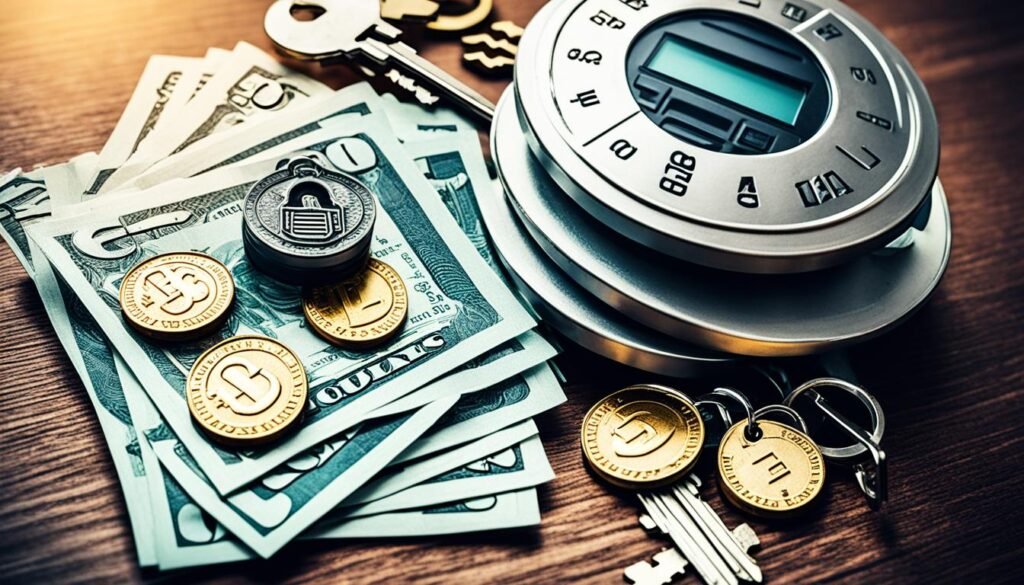
Secured loans offer various options depending on the borrower’s needs. Here are some common types:
Mortgages
Mortgages are secured loans used to finance the purchase of real estate properties. With a mortgage, the property being purchased serves as collateral. This allows lenders to offer competitive interest rates and longer repayment terms. However, failure to make mortgage payments can lead to foreclosure and the loss of the property. Mortgages are commonly used for purchasing a home or refinancing an existing mortgage.
Auto Loans
Auto loans are secured loans used to finance the purchase of a car or other vehicle. The vehicle being financed serves as collateral, making it easier to qualify for the loan and obtain better interest rates. If the borrower defaults on the loan, the lender has the right to repossess the vehicle. Auto loans typically have fixed repayment terms ranging from a few years to several years.
Home Equity Loans
Home equity loans allow homeowners to borrow against the equity they have built up in their property. The loan amount is determined by the difference between the property’s current market value and the outstanding mortgage balance. The home serves as collateral, and the loan can be used for various purposes, such as home improvements or debt consolidation. Home equity loans often have fixed interest rates and long repayment terms.
Secured Personal Loans
Secured personal loans are loans that are secured by collateral, such as a savings account or a certificate of deposit (CD). These types of loans can be used for various purposes, such as consolidating debt, financing a major purchase, or covering unexpected expenses. The collateral provides security for the lender, resulting in lower interest rates and more favorable loan terms for the borrower.
“Secured loans offer borrowers the opportunity to access larger loan amounts and favorable interest rates by providing collateral. However, it’s crucial to carefully consider your financial situation and repayment ability before taking on any secured loan.”
It’s important to note that the collateral requirements, loan terms, and interest rates for each type of secured loan may vary depending on the lender and the borrower’s creditworthiness. It’s recommended to compare loan options and seek professional advice to make an informed borrowing decision.
Secured loans work by using collateral to secure the loan, offering lenders reassurance against default. There are various options available, including savings-secured loans, auto-secured loans, and deposit-secured loans. To apply for a secured personal loan, individuals typically need to meet minimum credit score requirements. Lenders, such as credit unions and online lenders, offer secured loans with different terms and rates. These loans can be beneficial for those with less-than-perfect credit as they’re often easier to qualify for than unsecured loans. However, if borrowers fail to repay the loan, they risk defaulting and potentially losing the asset used as collateral. Home equity loans and HELOCs are common types of secured loans, while personal loans come in both secured and unsecured forms. It’s essential to understand the terms and conditions before applying for a personal loan to ensure the loan is repaid on time and to avoid default.
A secured loan, such as a secured personal loan, requires collateral, typically resulting in lower interest rates and larger loan amounts compared to unsecured loans. To get a secured loan, individuals may need to meet certain credit score requirements, especially if they have bad credit. Credit unions and lenders offer secured loans with varying terms and rates, often allowing borrowers to build credit as they repay the loan. When applying for a secured loan, the type of collateral used, like an auto loan or home equity loan, can affect the loan amount and interest rate. Secured loans work by using assets to secure the loan, offering lenders reassurance in case of default. However, it’s crucial to repay the loan on time to avoid negative effects on credit history. Utilizing tools like a personal loan calculator can help estimate loan payments and balance.
Also Read: Self Employment Loans: Quick Funding Solutions
Conclusion
Secured loans and unsecured loans are two types of borrowing options with distinct features. Secured loans offer lower interest rates and larger borrowing limits due to the collateral provided by the borrower. However, the risk of losing collateral is a significant factor that borrowers must consider.
On the other hand, unsecured loans do not require collateral, but they may come with higher interest rates. The absence of collateral means that lenders rely on the borrower’s creditworthiness, making the approval process more stringent.
When deciding between secured and unsecured loans, it is crucial to carefully assess your financial situation, including the risks and benefits associated with each option. Consider the amount you need to borrow, your ability to provide collateral, and your credit history. By making an informed decision, you can choose the loan type that suits your needs and helps you achieve your financial goals.
FAQs
Q: What is a secured loan?
A: A secured loan is a type of loan that is backed by collateral, such as your home or car, which serves as security for the lender in case you default on the loan.
Q: How can I get a secured loan?
A: To get a secured loan, you need to apply for one with a lender who offers secured loans. You will typically need to provide collateral for the loan, such as a savings account balance or a car title.
Q: Can I get a secured loan with bad credit?
A: Yes, it is possible to get a secured loan with bad credit. Since the loan is backed by collateral, lenders are often more willing to approve loans for individuals with lower credit scores.
Q: What are the benefits of applying for a secured loan?
A: Applying for a secured loan can help you build credit, as lenders report your payment history to credit bureaus. Secured loans also tend to have lower interest rates than unsecured loans.
Q: Do secured loans require collateral?
A: Yes, secured loans require collateral, which is the asset that the lender can seize if you fail to repay the loan as agreed. This reduces the risk for the lender and allows you to borrow larger amounts at lower interest rates.
Q: What types of collateral can I use for a secured loan?
A: You can use various types of assets as collateral for a secured loan, such as your car, savings account balance, home equity, or valuable personal belongings.
Q: How do secured loans affect my credit?
A: Timely payments on a secured loan can positively affect your credit, helping you build a positive credit history. However, failing to repay a secured loan can damage your credit score.
